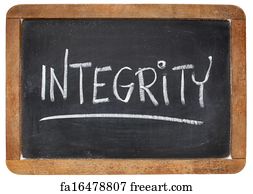Integrity
Have you ever watched someone’s behaviour and wondered how
they can possibly think that what they’re doing is ok? Perhaps you’ve wondered this about your own
actions – I know I have. For me, that’s
usually a good clue that I should reconsider what I’m doing.
- “firm adherence to a code of especially moral
or artistic values;
-- an unimpaired condition;
-- the quality or state of being complete or undivided”
While the second and third definitions appear to relate more
to items – something which is complete, or undamaged, I believe the whole
definition also relates to our behaviour and the way we live.
We all have a moral code.
I’ll admit that I wonder about those to which some people adhere as they
certainly don’t seem to match with my own standards. But even someone of disreputable character has such a code – they truly believe
that they are doing what’s best. It may
not be what’s best for anyone around them, but in the place where they are,
they believe it’s best for them. That’s
adherence to a code.
I consider my code to be pretty straightforward: I need to behave in a way that I’m not
ashamed to look at myself in the mirror.
That means that I try to make choices which don’t harm those around
me. It means that I make an effort to do
things to help others. It also means
that I honour my own self-worth – something I spent many years learning to
build – by acting in a way that also doesn’t harm me. For me, integrity includes areas such as
doing my best in all I do, in taking rest for myself when I need it, and in “filling”
my soul by spending time on causes that matter to me, and with people I love.
What is an “unimpaired condition”? Physically speaking, it sounds like something
that’s undamaged, and functioning properly.
When I ran a bar some years ago, I made the rather obvious deduction
that drunkenness is called “impaired” for a reason. Judgment is impaired. (If you’ve never spent much time listening to
a drunk person’s reason, just take my word on this one). Someone who’s drunk – or high, or simply
misinformed in some cases – has impaired judgment. What might your, or my, judgment be impaired
by? Inaccurate information, emotional
responses which take over a clear mind, a bias against someone who’s wronged
you in the past, and more. If we’re to
truly demonstrate integrity in our lives, we need to ensure that we are in an unimpaired
condition.
Then we get to “complete or undivided”. How does that apply to behaviour which
demonstrates integrity? For me, this
goes to commitment. Have you ever heard
the expression “I’m of two minds about that”?
While considering other opinions is both valid and important, you can’t
commit to a course of action with integrity without, well, committing. Being sure
about what you feel is right. If you’re
not sure it’s right, wait, or thing more.
(And yes, there are times where fast action is needed. That’s where I just trust my intuition and
that the universe is always acting for my best interest).
Integrity becomes a lot more complicated when we look at it
this way, doesn’t it?
As with so many of these lessons, this one comes out of
Today’s lesson, though, is a simple one – at least, it is
for me. I still like C.S.Lewis's definition of integrity: Integrity is doing the right
thing even when no one is watching. This is it for me. That’s what means I can keep looking at that person in the mirror, or at
least, to do my best to do so. Are you demonstrating integrity in your daily
life?





Comments
Post a Comment